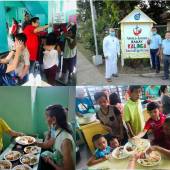Filipino tribal school advises graduates to "Embrace the Challenges of Life Towards A Strong Tomorrow"

The 28th moving-up ceremony, or agbikang, of the tribal school, exhorted its 27 graduates to 'Embrace Life's Challenges for a Strong Future' on July 8 in Naujan town, Oriental Mindoro province.
An animal horn announces the commencement ceremony at the Tugdaan Mangyan Center for Education and Development.
The school, also known as Tugdaan, is situated on five acres of community-donated land at the base of Mount Halcon, central Philippines.
Tugdaan is an Alangan term that means "seedbed to depict an education that is based on our culture, needs, realities, and aspirations," said Ligaya Lintawagin, director of Tugdaan. All faculty members are already Mangyans.
The graduate students came from the Mangyan tribes of Alangan, Hanunuo, Tadyawan, and Iraya.
The three-part ceremony included a Holy Mass, graduation rites, and the community's Thanksgiving ceremony (agpamago).
In his homily, Father Nestor Adalia, apostolic administrator of the Apostolic Vicariate of Calapan and member of the board of trustees of Tugdaan, emphasized the significance of the present moment in addition to discussing "embracing life's challenges for a strong tomorrow."
He stated that this perspective is also "important in the present."
Graduation rites were indigenized. The ornamentation was comprised of elements from the surrounding environment. The limbutong and bayakes, cloth items for formal Mangyan occasions, were initially gifts from parents to graduating students.
This was followed by a parade of Philippine flags, the flags of Tugdaan, the graduating students, their parents, the leaders of SANAMA (the people's organization Samahan ng nga Nagkakaisang Mangyan Alangan), the village, Tugdaan, and the guests present.
The bagid ritual, or fire-making from materials from the environment, recognized the life-giving value of fire. The tawtaw ritual was done by the elder, for spiritual cleansing and prayer for a successful activity.
This was followed by a symbolic offering of fire "where light comes from", water for life, soil or land for livelihood, air for peace, seed, and seedbed for their historic value in the lives of the Mangyan Alangan and the world.
Following the singing of the national anthem and a greeting address by a student, the planting and harvesting ritual taruk was performed.
Special awards were given in the form of symbols: Bonbon Bautista received the dictionary for leadership, sandals (light shoes), the Bible for missionary service spirit, and the bolo for environmental care. Jenelyn Balyunan was awarded a malong for her appreciation of culture. Nine additional recipients were honored.
Alumni of Tugdaan, Rafael Paing, was the featured speaker at the event. "Education is the treasure that cannot be stolen," he said as he thanked everyone and every institution, particularly Tugdaan, for helping him become who he is today.
Academic award winner Ma. Sandra Alcantara moved the audience to tears with her speech. Guests Father Gabayno Oybad, the first Mangyan priest, and Father Ewald Dinter, SVD, a missionary priest, gave them a fatherly stroke to encourage them.
She acknowledged the efforts of her parents, whom she had to assist on the farm (kaingin). It was helpful that she received a scholarship.
"All sacrifices paid off, she said. "If you surrender in life, you lose. If you fight, you win. If I do win, you also can."
Following the pledge of allegiance, the graduates sang their theme song, "This Is Our Dream," which encouraged everyone to continue to pursue their dreams, including cultural recognition around the globe.
Ma. Cristina Saballa, the principal of Tugdaan, told RVA News that 300 Mangyans from various communities participated in Saturday evening's agpamago, a thanksgiving ritual involving the pounding of rice, chanting, and dancing.
"The Mangyan were filled with joy, especially when the elderly exchanged spontaneous messages on their experiences of the agpamago. They sang these through "banggian," she said.- Madonna T. Vorola.
Radio Veritas Asia (RVA), a media platform of the Catholic Church, aims to share Christ. RVA started in 1969 as a continental Catholic radio station to serve Asian countries in their respective local language, thus earning the tag “the Voice of Asian Christianity.” Responding to the emerging context, RVA embraced media platforms to connect with the global Asian audience via its 21 language websites and various social media platforms.














